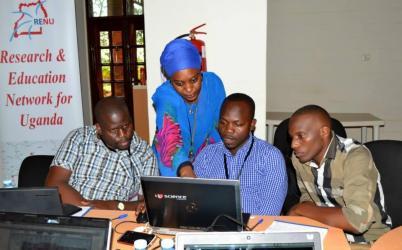by Victor Thien
Organisations are faced with a multitude of challenges when it comes to identifying suitable employees with matching qualifications in African countries and cities. African employment markets are highly fragmented, increasing the difficulty for organizations to find new employees with specific skills efficiently, given the high number of job seekers applying to a fraction of available jobs in most African countries. To put challenges into perspective […]
Field Stories
Using Mobile Technology to Enhance Learning Transfer
By Corinne Brion, PhD, University of Dayton, U.S.A Today, I invite you to Ghana to present the findings of a study that examined the extent to which mobile technology enhanced the transfer of learning post training. Seven school leaders from three different schools were interviewed after they attended a three-day leadership training. Additionally, I sent conversation triggers twice a week using WhatsApp. For […]
Building Capacity for Science, Technology and Innovation: Experience and Role of the African Capacity Building Foundation
By Herbert Robinson, Director; Robert Nantchouang, Senior Knowledge Management Expert; Barassou Diawara, Knowledge Management Expert, Knowledge and Learning Department, The African Capacity Building Foundation, Zimbabwe
At a time when African countries are implementing the post-2015 development agenda and Agenda 2063 First-Year Implementation Plan, the role of Science, Technology and Innovation (STI) in achieving the set targets and goals cannot be overemphasized. For instance, Agenda 2063 recognizes […]
Students with a Passion for Realising Gender Empowerment
By Brendan O’Malley, University World News
This article is part of a series on Transformative Leadership published by University World News in partnership with Mastercard Foundation. University World News is solely responsible for the editorial content. Tanyaradzwa Chinyukwi, 24, grew up in an environment in southern Zimbabwe, where life was tough and girls were always looked down upon. She was born in Masvingo and from the age of two to eight […]
A Single Step Forward
On the 15th September this year, a young Englishman set out on a sponsored bicycle ride with some friends to raise money for a school thousands of miles away in Namibia. It was started by his aunt and eLearning Africa hears the remarkable story of her love for a German missionary and how their joint passion, now shared by their whole family, is making […]
A Ray of Light in Africa’s Darkest Corner
Harold Elletson talks to Congolese champion of disabled people and one of Africa’s most remarkable educators – Hortense Kavuo Maliro In August 2016, three days after a visit by the President of the Democratic Republic of Congo, Joseph Kabila, to the province of North Kivu in the north east of the country, a group of armed men, some of whom were dressed as soldiers, […]
Technology is a liberating force for African women
By: Charles Onyango-Obbo, Publisher of Africapedia As ride-hailing apps proliferate the globe, An Nisa Taxi in Kenya is one of the standouts in Africa. Developed by 33-year-old Mehnaz Sarwar, An Nisa is run by women and serves female passengers and children exclusively. Ms. Sarwar sought to overcome two obstacles: limited job opportunities for women in a male-dominated industry and the reluctance of women to hail […]
A Scholarship, an Online Course and a ‘Dream Come True’
By Caroline Newman, Senior Writer and Assistant Editor of Illimitable Office of Communications, University of Virginia Selam Kairu lives in Nairobi, Kenya, but she credits a lot of her business’s growth to lessons learned from the University of Virginia’s Darden School of Business, approximately 7,600 miles away. Since beginning online studies with Darden, Kairu and her husband Ken, who jointly started an insurance agency, […]
Highlighting the need to accelerate eLearning adoption in Uganda
By Isaac Kasana, Research & Education Network for Uganda Introduction For many years, the primary thrust of eLearning was to complement or enhance distance-learning needs: to make it more affordable and more accessible for the learners and also to enhance the educators’ throughput. With the developments in technology capability over the past 12 years, eLearning in its own right can now address many more education […]
Education and Technology are Changing Africa: Skills for a Digital Age and for All
by Sheila Jagannathan, Lead Learning Specialist, World Bank Rwanda’s progress from the devastating civil war two decades ago to one of the most rapidly developing African countries is a remarkable narrative on development. Twenty-four years ago, the country was torn apart by civil war and one of the worst genocides human history has known; one in which more than a million people were killed […]























